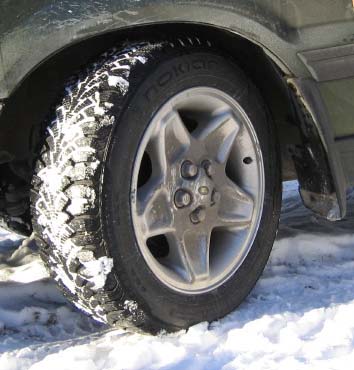Finding the right winter tires for your vehicle is essential as they play a crucial role in the safety of you and your passengers. You need the right tire for the right your climate. For winter, you need a tire that adds traction as well as control in the event of inclement weather.
The following are some points to consider when looking for the right winter tires for your vehicle:
• All Season vs. Winter Tires. While all season tires have good performance throughout the year in a variety of weather conditions, their performance can be compromised on snowy, wet or icy surfaces. Winter tires deliver the best control in these conditions as they are made with heavier tread patterns that improve control and traction and assist braking. The depth of the tread allows a greater surface area of the tire to come in contact with the surface. The more surface area contact increases the ability of the tire to push forward through snow and ice.
• Traction control or anti-lock braking systems. Unfortunately, these will not improve your vehicle's traction when it comes to winter driving on snow- and ice-covered roads. Only dedicated winter tires will actually improve your vehicle's performance and control in winter conditions. Additionally, if you have all wheel or front wheel drive, you will still improve your safety by using winter tires.
• Replacing your tires. As with any type of tire, it is important to look for signs such as worn treads, bulges or cracks. If any of these are present, your tires will need to be replaced. It is recommended that you replace all four tires to provide you the best traction and control. If you replace only the front tires with winter tires and leave all season tires on the rear, it can possibly cause you to spin out in slippery driving conditions. This can be a greater concern if the rear tires are worn. While replacing just two tires may be less expensive up front, the costs involved in an accident are likely to be much higher in the long run.
• With some winter tires, they are marked with a symbol of a snowflake on mountains which designates that these tires have passed a stringent Severe Winter Traction Standard. The ideal tread depth of winter tires is 6/32 inch or more.
• Size matters. Your ASE (Automotive Service Excellence) Certified Technician will recommend the best tires that will fit your vehicle properly. This is essential as buying too small or too large tires can greatly hinder your vehicle's performance and safety.
• Tire maintenance. As with all types of tires, you need to make sure they are properly inflated at all times. Air pressure can be checked with an air gauge, and should be done at least once a week in the winter as your tires can lose pressure due to drops in temperature. By making sure that your tires are properly inflated, it will also help with your vehicle's gas mileage.











0 comments:
Post a Comment